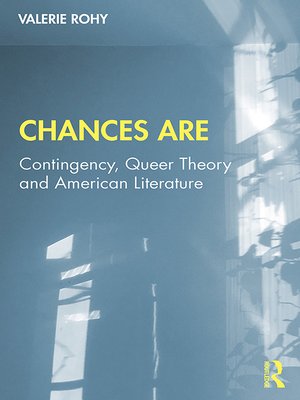
Sign up to save your library
With an OverDrive account, you can save your favorite libraries for at-a-glance information about availability. Find out more about OverDrive accounts.
Find this title in Libby, the library reading app by OverDrive.



Search for a digital library with this title
Title found at these libraries:
| Library Name | Distance |
|---|---|
| Loading... |
This innovative work makes use of psychoanalytic, queer, and narrative theories to read nineteenth and twentieth-century American literature and demonstrate how the concept of contingency—whether chance, accident, luck, or mutation—enriches our understanding of how queer sexualities are articulated.
Perhaps love always carries an element of contingency (our attraction to a particular person can be arbitrary and inexplicable), and a sense of necessity (we find that we cannot imagine life without them). But contingency and chance mean something different for queer subjects. In a heteronormative culture, heterosexuality claims to be necessary (it must be), whereas homosexuality not only could be otherwise, but perhaps it should be otherwise, and probably it should not be at all.
This book outlines why and how issues of chance and contingency should matter to queer theory and queer literary studies. Combining psychoanalytic, queer, and narrative theories, Chances Are considers nineteenth- and twentieth-century American literary texts that formally or thematically involve contingencies of their own, including narrative coincidences and accidents, the role of luck in notions of race and class, and efforts to imagine queer hermeneutic methods that make space for contingency. Literary texts include Edgar Allan Poe's "The Mystery of Marie Rogêt" (1842), Horatio Alger's Ragged Dick novels (1868-69), Frank Norris's The Pit (1903) and Edith Wharton's The House of Mirth (1905), Frances E.W. Harper's Iola Leroy (1892) and Nella Larsen's Passing (1929), H.D.'s Tribute to Freud (1956), and Alison Bechdel's Are You My Mother (2012).
This dynamic and original text would be suitable for students and researchers in literary studies, critical theory and women's and gender studies.







